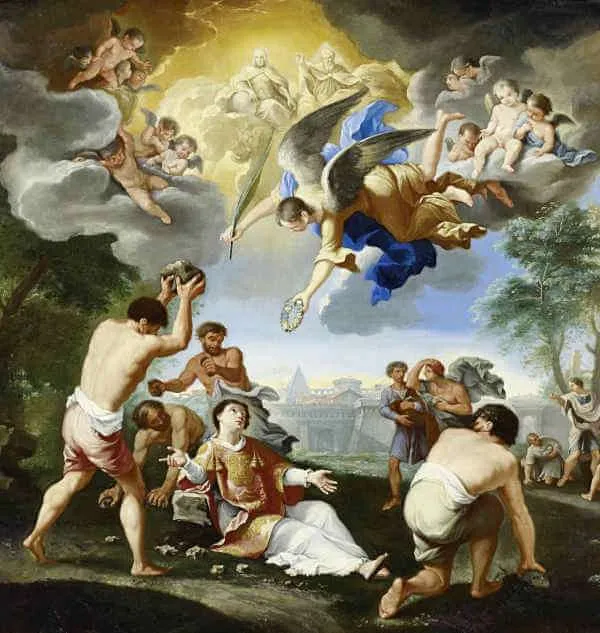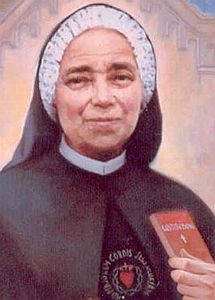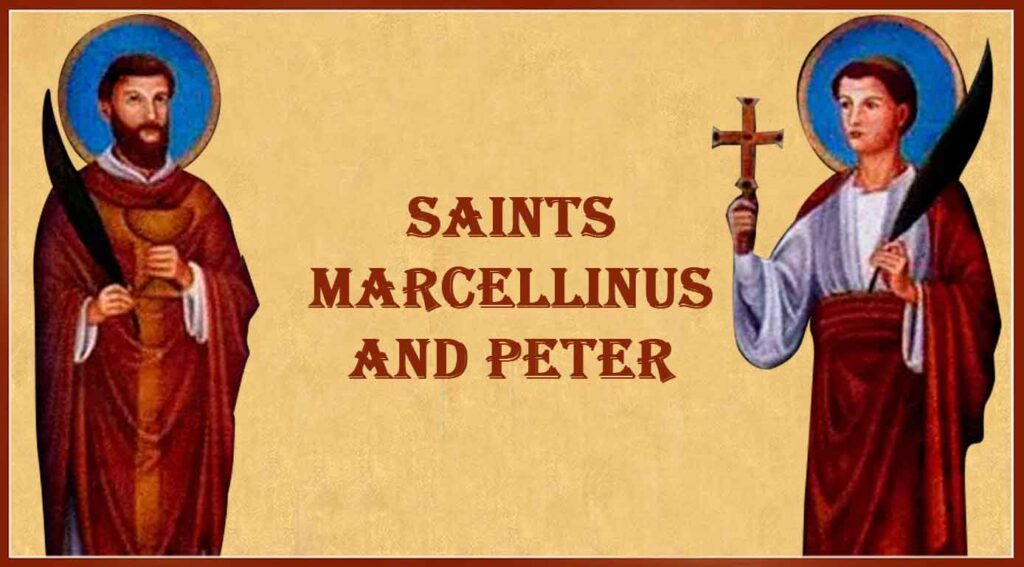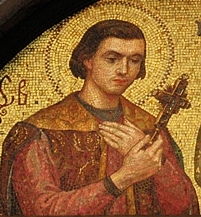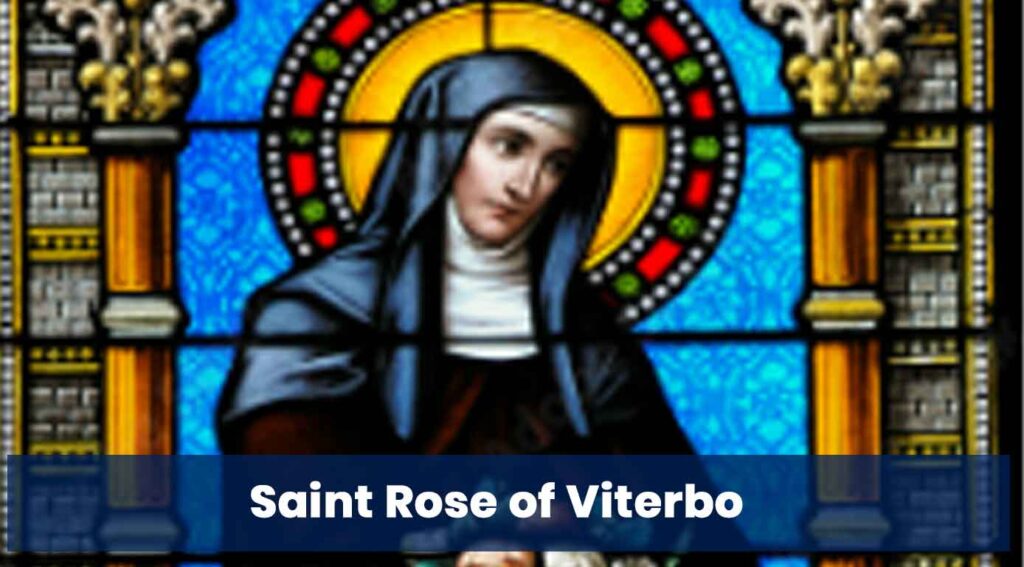Patron Saint of altar servers, builders, casket makers, deacons, horses, masons, and quarrymen Invoked against headaches
The early Jerusalem community was made up of both Hebrew and Hellenistic Jews. Hebrew Jews were native to Judea and primarily spoke Aramaic as their common language. They closely adhered to traditional Jewish customs and used the Hebrew language in religious practices. The Hellenistic Jews typically spoke Greek and were influenced by Greek culture, due to their assimilation into the broader Greco-Roman society throughout the Roman Empire.
Both Hellenists and Hebrews were converting to Christ and were living as one united people in Jerusalem. However, biases reportedly remained: “At that time, as the number of disciples continued to grow, the Hellenists complained against the Hebrews because their widows were being neglected in the daily distribution” (Acts 6:1).
Because the Apostles chose to devote themselves to prayer and the preaching of the Word, they asked the community to select “seven reputable men, filled with the Spirit and wisdom” (Acts 6:3). The Apostles then appointed them to the task of overseeing the daily distribution of provisions. The Apostles prayed and laid their hands on these seven men, ordaining them the Church’s first deacons. They were “Stephen, a man filled with faith and the Holy Spirit, also Philip, Prochorus, Nicanor, Timon, Parmenas, and Nicholas of Antioch, a convert to Judaism” (Acts 6:5).
Some ancient traditions identify Stephen as the eldest and the leader of the others, making him what has become known as “Archdeacon.” Stephen was likely a Greek, so he might have been chosen, in part, to help ensure that the Hellenistic women, especially the widows, received their share of the daily distribution.
As a deacon, Stephen also preached the Word of God and performed many miracles. Various Hellenistic Jews even debated him in public, “but they could not withstand the wisdom and the spirit with which he spoke” (Acts 6:10). This so agitated them that they dragged him before the Sanhedrin, just as they had done to Jesus. The Sanhedrin was the highest religious, judicial, and legislative body within the Jewish community. The charges brought against Stephen were that he spoke against the Temple and the Law of Moses. As Stephen stood before the angry Sanhedrin, his face appeared like that of an angel.
Acts 7:1–53 presents a lengthy speech Stephen made before the Sanhedrin. It is one of the longest and most significant speeches in the New Testament. In that speech, Stephen traced the history of Israel from Abraham to Solomon, who built the Temple. He emphasized God’s actions that took place outside of the Temple, as well as Israel’s recurring disobedience. Of the Temple, he said, “the Most High does not dwell in houses made by human hands” (Acts 7:48).
In other words, the Temple had outlived its purpose. The Most High came to us in the Person of Jesus, and Jesus is the New Temple and the New Priest Who offered Himself as the New and Perpetual Sacrifice. Stephen re-read and reinterpreted the Old Testament in the light of Christ. He was among the first followers of Christ to clearly unite the Old Testament with the unfolding New Testament. He also referred to the members of the Sanhedrin and those accusing him as “stiff-necked people.”
Recall from Jesus’ trial that the Sanhedrin, while under Roman occupation, could not condemn a person to death. The Romans reserved that to themselves. In Stephen’s case, his accusers were so infuriated that they immediately dragged him outside the city (probably the northern gate) and stoned him to death. This horrible situation, however, turned truly beautiful and glorious on account of Stephen’s faith.
Before being dragged to the spot of his death, he looked up to Heaven and exclaimed, “Behold, I see the heavens opened and the Son of Man standing at the right hand of God” (Acts 7:56). Once they dragged him out and began stoning him, he prayed, “Lord Jesus, receive my spirit” and “Lord, do not hold this sin against them” (Acts 7:59–60). Notice the similarities to Jesus Who cried out from the Cross, “Father, forgive them…” (Luke 23:34) and “Father, into Your hands I commend my spirit” (Luke 23:46). As the author of the Gospel and the Acts of the Apostles, it is clear from those passages that Saint Luke intended this connection.
Among those who consented to Saint Stephen’s martyrdom was the Pharisee Saul, who would later convert, become the great Apostle to the Gentiles, and go by his Roman name, Paul. After his conversion, Saint Paul built upon the teaching of Saint Stephen, developed it and deepened it, continuing the mission of one whom he helped persecute and kill. It is clear that Saint Stephen’s final prayer was heard by God and especially applied to Saul.
Saint Paul would later write in a letter to the Romans, “We know that all things work for good for those who love God, who are called according to his purpose” (Romans 8:28). Nothing truer could be said about Saint Stephen’s martyrdom. At first, there was great fear and chaos. “On that day, there broke out a severe persecution of the church in Jerusalem, and all were scattered throughout the countryside of Judea and Samaria, except the apostles” (Acts 8:1).
The close Christian community scattered, running for their lives. In God’s wisdom, this scattering became the first great means of evangelization. Christians brought Christ within the temple of their souls to people far and wide. One by one, new hearts were converted, and the scattered community shared the New Law of Christ with others.
One tradition states that Saint Stephen was buried in the town of Beit Jimal, about twenty miles west of Jerusalem. Legend has it that in 415, a priest named Lucian had a dream in which Saint Stephen’s burial place was revealed to him. The priest brought his remains back to Jerusalem, and some years later Stephen was buried at the site of his martyrdom, in what is today the Church of Saint Étienne (French for Stephen). In his book, City of God, Saint Augustine says that some of Saint Stephen’s relics were brought to “waters of Tibilis,” which was most likely in North Africa. Augustine then recounts many stories of miracles that took place in the lives of those who encountered his relics.
As we honor the Church’s protomartyr, ponder the profound truth that God always brings good out of suffering when that suffering is prayerfully united to Christ. In honor of Saint Stephen, as you reflect upon his life and death, call to mind any sufferings you endure. Whether those are physical, mental or emotional, are caused by illness, persecution or any other source, seek to unite yourself and your sufferings to Christ. If part of your suffering results from the sins of others, pray the prayer Saint Stephen prayed, “Lord, do not hold this sin against them.” And throughout your life, pray with him, “Lord Jesus, receive my spirit.” Pray, also, for his intercession, especially for courage and strength to fulfill God’s will in your life.
Source: https://mycatholic.life/saints/saints-of-the-liturgical-year/26-december-saint-stephen-the-first-martyr–feast

